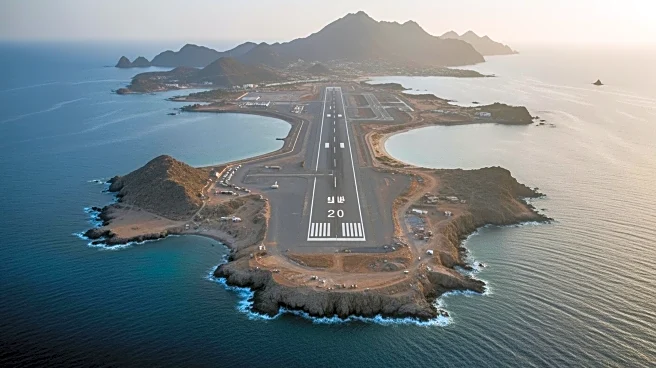What's Happening?
Satellite images have revealed the construction of a new airstrip on Zuqar Island in the Red Sea, off the coast of Yemen. This development is likely spearheaded by forces opposed to the Iranian-backed Houthi rebels. The airstrip is part of a growing network
of offshore bases in a region crucial to international shipping. The Houthis have previously attacked over 100 ships in the area, highlighting the strategic importance of the Red Sea and the Bab el-Mandeb Strait. The construction of the airstrip could enhance military capabilities for aerial surveillance over these critical waterways. The United Arab Emirates, which has been involved in similar projects, has not commented on the construction. The anti-Houthi forces, despite being fragmented, have recently intercepted cargo bound for the Houthis, potentially aided by the new airstrip. Zuqar Island has a history of conflict, having been captured by Eritrea in 1995 and later returned to Yemen's custody by an international court in 1998.
Why It's Important?
The construction of the airstrip on Zuqar Island represents a significant strategic move in the ongoing conflict against the Houthi rebels. It could bolster anti-Houthi forces' ability to monitor and counter smuggling activities, particularly of weapons, which have been a critical aspect of the conflict. The airstrip's location in the Red Sea, a vital shipping route, underscores its potential impact on international trade and security. The development may also signal a possible escalation in military operations against the Houthis, backed by the Saudi-led coalition. The presence of such infrastructure could shift the balance of power in the region, affecting the dynamics of the Yemeni conflict and the broader geopolitical landscape.
What's Next?
The completion of the airstrip could lead to increased surveillance and military operations in the Red Sea and surrounding areas. Anti-Houthi forces may use the airstrip to enhance their capabilities in intercepting smuggling routes and conducting reconnaissance missions. The strategic positioning of the airstrip might prompt reactions from the Houthi rebels, potentially escalating the conflict. The international community, particularly countries involved in shipping through the Red Sea, may closely monitor developments to assess the impact on maritime security. The UAE's involvement in similar projects suggests that further infrastructure developments could be anticipated, potentially altering the course of the conflict.
Beyond the Headlines
The construction of the airstrip on Zuqar Island raises questions about the long-term implications for regional stability and the balance of power in the Middle East. The involvement of external actors, such as the UAE, highlights the complex geopolitical interests at play. The airstrip could serve as a deterrent against Houthi aggression, but it also risks further entrenching divisions within Yemen. The focus on countering smuggling activities underscores the broader challenges of arms proliferation in conflict zones. The development may also influence diplomatic efforts to resolve the Yemeni conflict, as stakeholders reassess their strategies in light of new military capabilities.
















